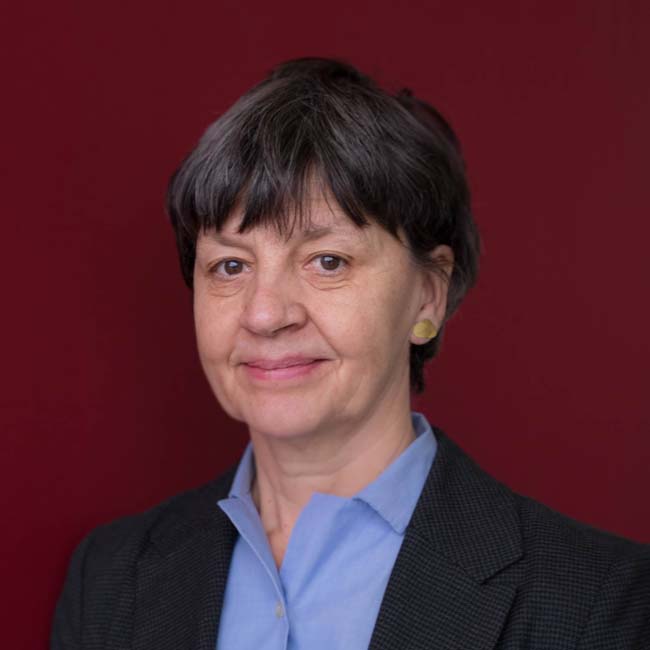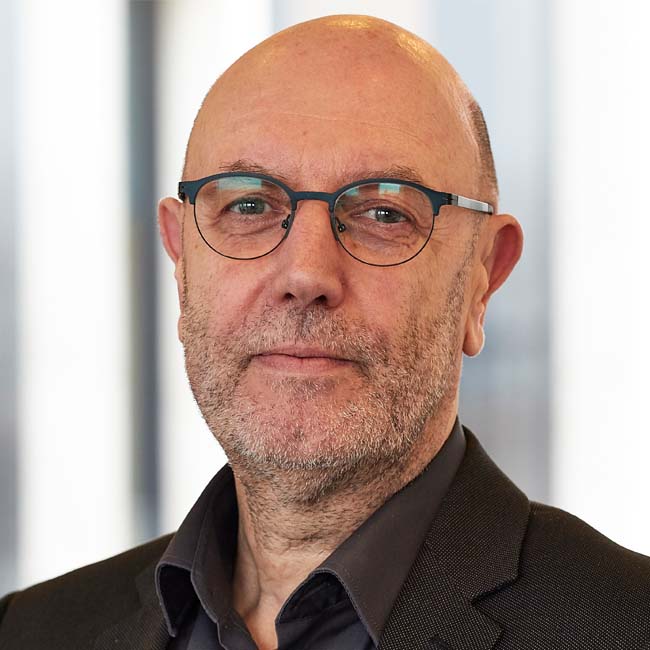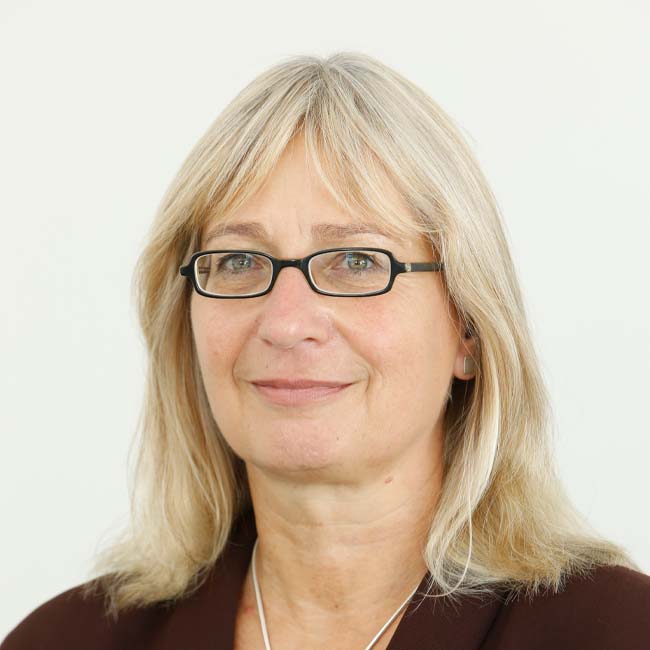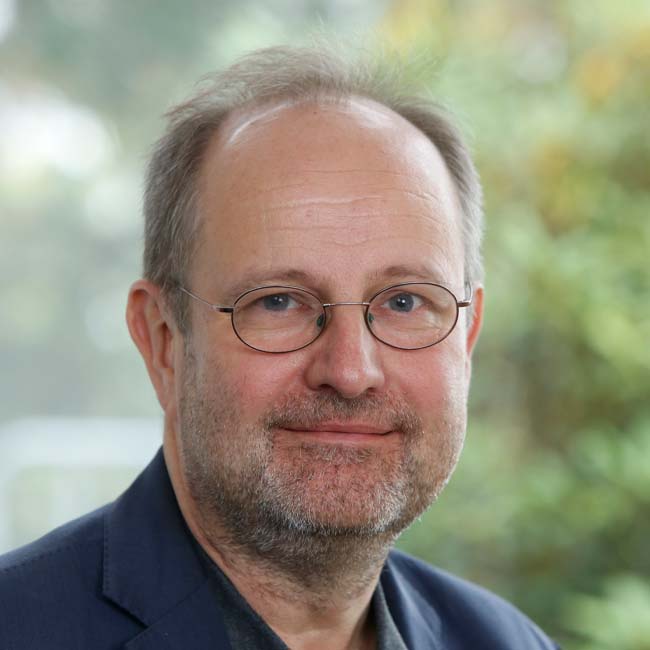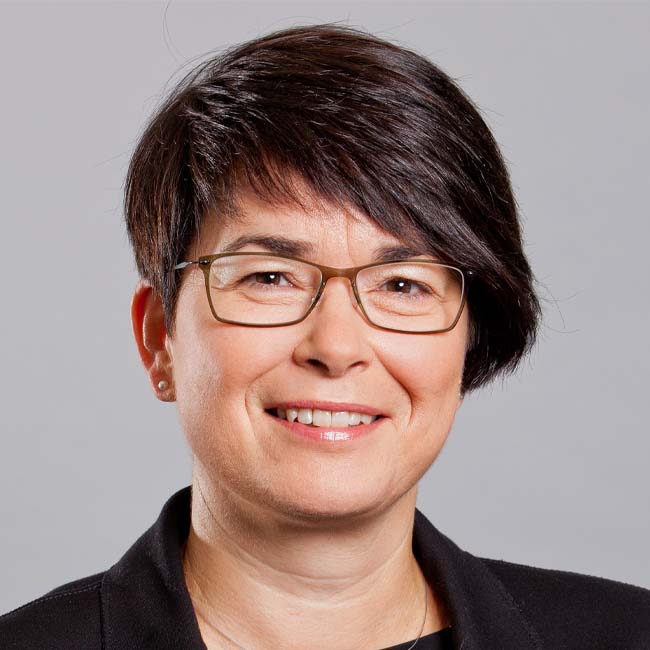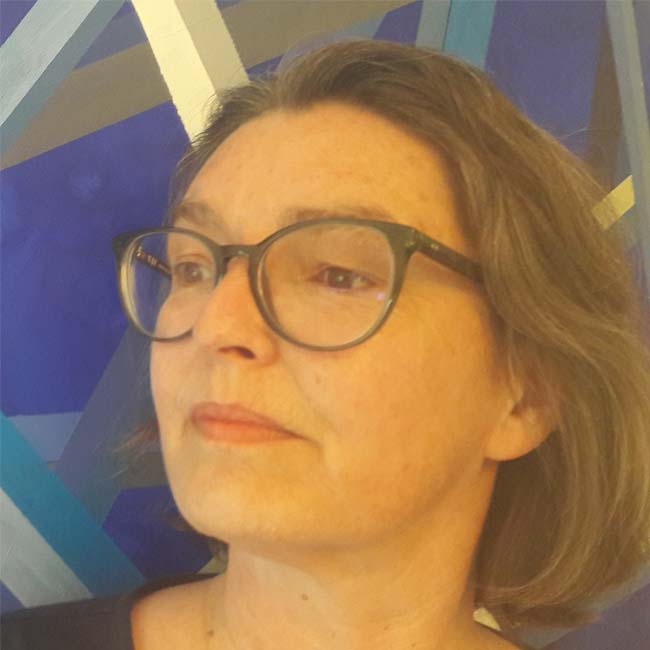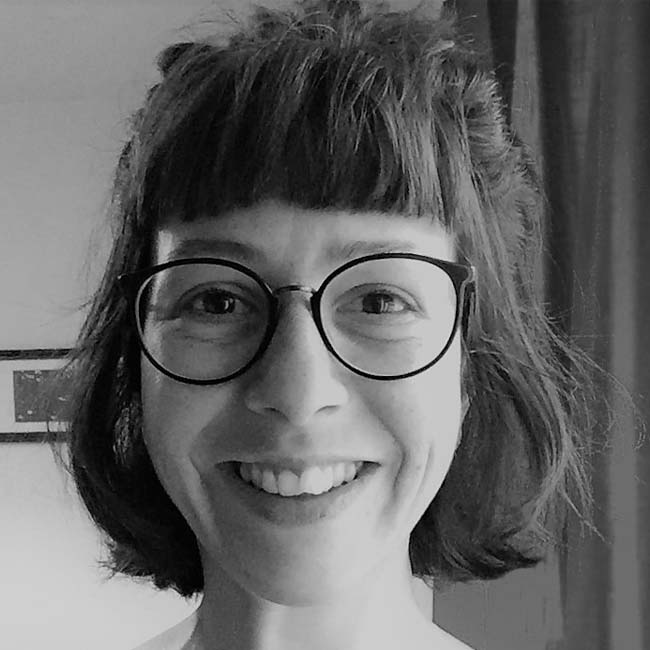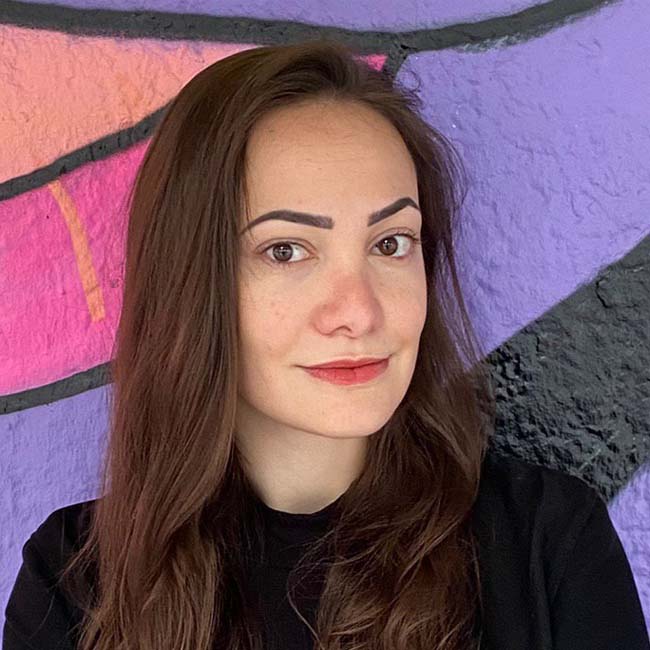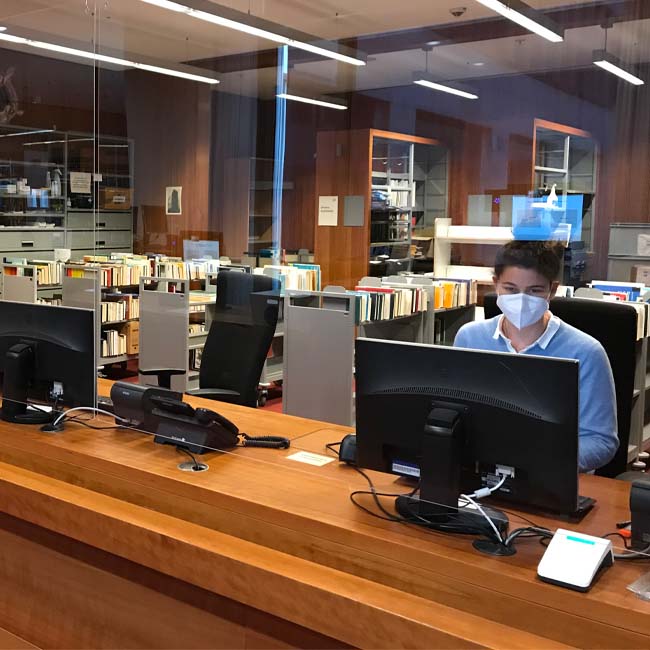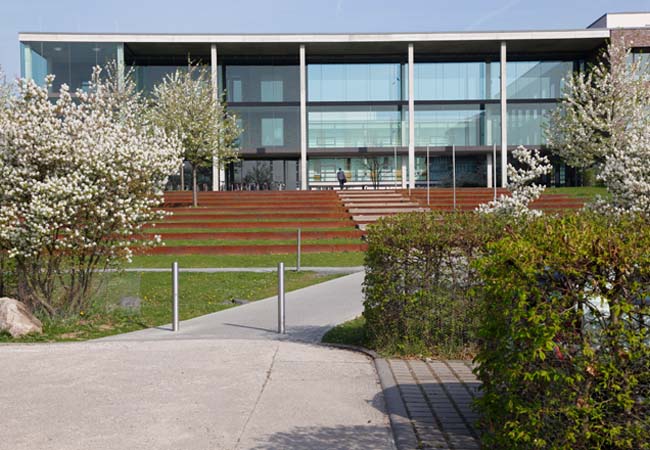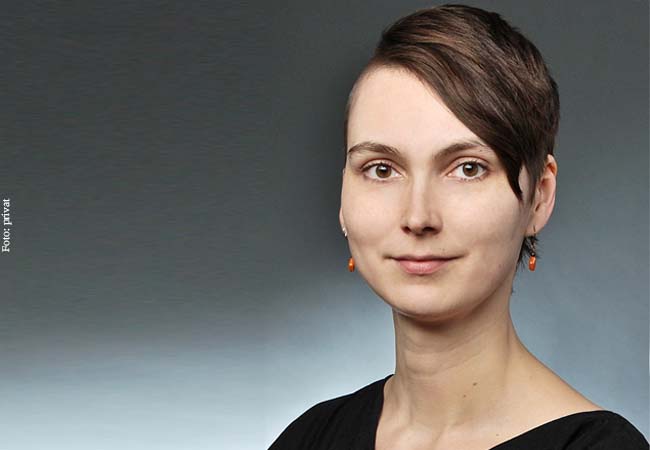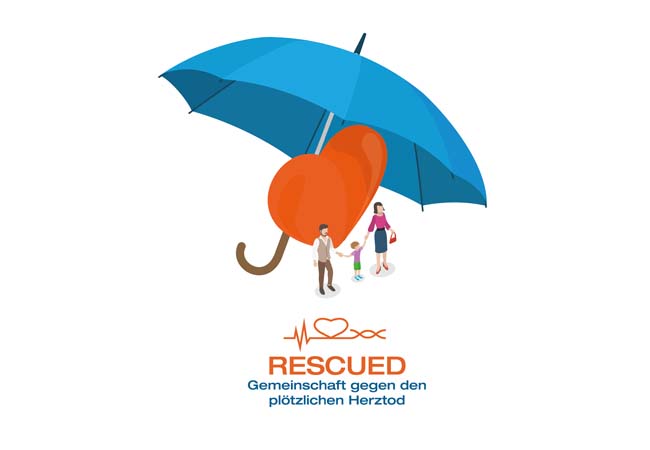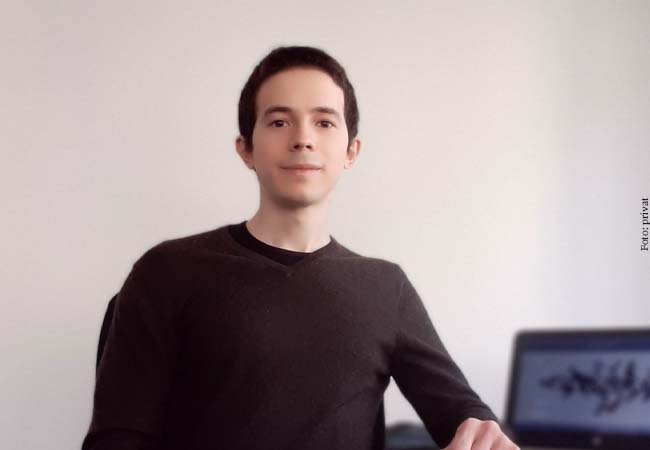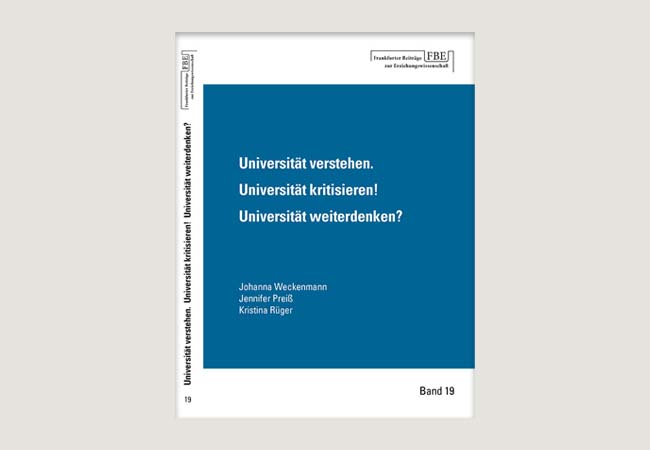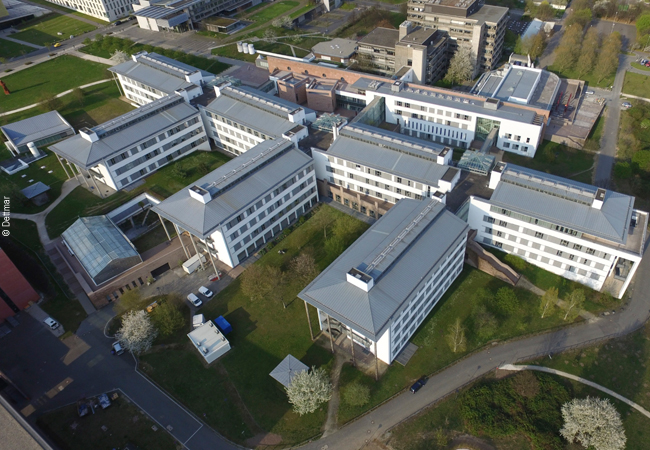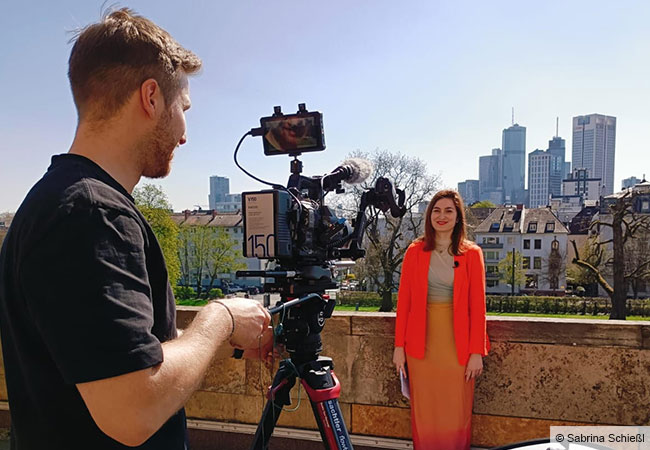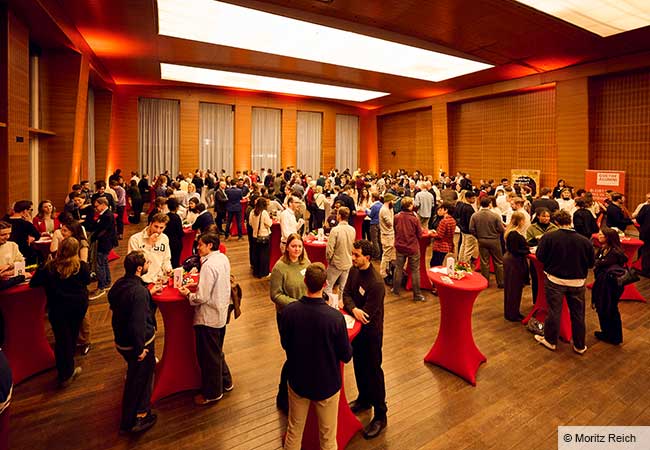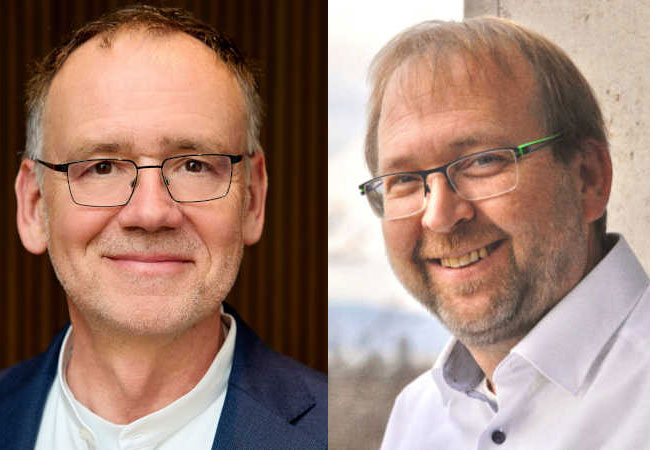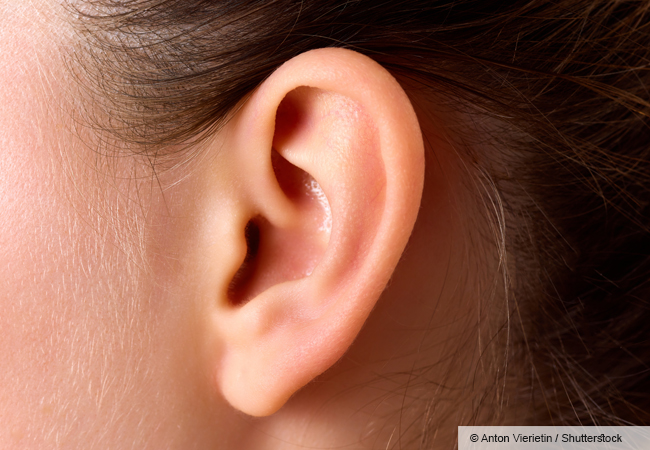In the middle of March last year, the coronavirus pandemic also arrived at Goethe University: Teaching operations in the semesters that followed were and continue to be carried out in digital mode, many employees have since then been working from home, hygiene and distance regulations are in force in rooms and public spaces. In the shortest of times, work processes had to be reorganised and numerous services switched to digital processes. But most important of all: the number of infections was able to be kept low. UniReport asked a number of university members in academics, administration and the student body about their experiences and insights during this extraordinary year.
Professor Birgit Blättel-Mink, Dean of Faculty 03, Social Sciences
In mid-March of 2020, the meeting of the board of directors of the German Sociological Association (DGS) was to take place in Berlin, where the 40th DGS Congress on “Society under strain” was planned. The meeting was cancelled at short notice and as chairperson, I found myself sitting alone in a video room in the PEG building in front of a wall of animated thumbnails. In April of 2020 I took over as dean of the Faculty of Social Sciences – to this day, we have had to continually postpone a date to raise the glass in welcome. While at first there was hope that things would quickly return to normal, it was the students who over the course of the Summer 2020 semester demanded an unambiguous adaption to the situation for better planning ability. The digitalisation of teaching implies spatial freedom, i.e., one can give up the expensive apartment in Frankfurt and move back home – even if this results in a greater distance to campus (life). The Executive Board, however, clung to the hope of a return to in-person teaching for a long time, only to ultimately declare virtuality, or a certain amount of hybridity at the most. The digitalisation requirement translated into home office for employees, which is underregulated to this day, but has become a kind of new normal. In my view, it is not least the lack of the ability to plan and the continuing uncertainty or narrative of “muddling through” that leads to a disastrous situation. The burden on all status groups is increasing. The social and psychological consequences of this situation are not yet identifiable. Thus, nolens volens, the coronavirus opens up a new field of research for us.
Dr. Albrecht Fester, Goethe University Executive Vice President for Finances and Administration
This was and continues to be a challenging year with a heavy workload for every member of our university. In order to provide the best possible support for research and teaching, we have newly sorted and reorganised workflows in the administration in a very short time, and converted many services to digital processes. We have also invested a lot of money, for example in mobile devices and software in the administration and faculties, as well as in digital teaching. Money that, in my view, is well invested, because these innovations give us a momentum that we want to continue to use. The continuous adaptation of university operations to constantly changing coronavirus regulations also requires a great deal of work. However, the effort is worth it. I know from first-hand experience that the virus is not to be trifled with. As early as March 2020, we made as much use as possible of home office or work in alternating shifts. Hybrid semesters with predominantly digital formats and selected in-person instruction have been another mainstay. Through good hygiene concepts and a toolbox for carrying out in-person activities (such as internships and exams), we have succeeded in keeping the number of infections low. Currently, it looks like we still have a challenging time ahead of us. I would therefore like to thank everyone for their tireless commitment and I look forward to the time when we can return to what university is all about: direct exchange and discourse as well as a lively campus.
Dr. Anja Wolde, Equal Opportunities Representative and head of the Equal Opportunities Office
Depending on their life situation, the pandemic has posed different challenges for the team members of the Equality Opportunities Office. On the work level, we have been able to meet these challenges by working from home to the greatest degree possible, by successively providing as many team members as possible with the necessary equipment, with many new platforms for both formal and informal dialogue, by accepting that different individuals have different levels of resilience, converting our events to online formats, and jointly reflecting on the changes. In terms of substance, we have been confronted with new and/or intensified problems: For female academics (and some male academics) with care responsibilities in particular, the pandemic is proving to be a barrier to further career paths and is calling into question gender equality goals that were only recently achieved. Some female administrative staff are struggling with inadequate technical equipment in their home offices, and working together at a distance has in many cases been a process of trial and error. The conversion of teaching to online formats is associated with new exclusions and inclusions for students and we have had to deal with „new“ forms of discrimination. A topic that remains open for all of us at the university is that online work leads to a further compression of work – how do we deal with this? And how will we receive the many students after the pandemic who to this day have hardly seen their university from the inside?
Professor Harald Schwalbe, Professor for Organic Chemistry and Chemical Biology
Since 26 March 2020, we have been working day and night on SARS-CoV-2 at the Centre for Biomolecular Magnetic Resonance (BMRZ). A year ago, we decided to ask our colleagues around the world if we wanted to study the components of the virus in a globally coordinated way. This gave rise to the covid19-nmr.de consortium, in which more than 200 scientists from 17 countries are conducting joint research. The international consortium is led by Goethe University. In these twelve months, we have succeeded in investigating the structure of all viral RNAs (Wacker, Weigand et al., 2020) and almost all proteins (Altincekic et al., 2021). We are researching which potential drugs bind to these viral targets (Sreeramulu, Richter et al., 2021, under revision) and synthesising new potential drugs on this basis. SARS-CoV-2 has changed the way we do science. Pre-publishing all of our results, sharing all of our resources – for this we have been passed over, even by colleagues here in Frankfurt who do not share. But this is a small price to pay when it comes to doing something about SARS-CoV-2.
Silvia Dabo-Cruz, University of the Third Age
“Closed until further notice“ – in contrast to what the sign on our door suggests, operations at U3L (University of the Third Age) never stood still. The switch from in-person to online programmes during the last two semesters demanded copious amounts of work. The need for accompanying support and training was also immense at times. Meanwhile, there are many practised online users in the U3L community. The number of attendees in the Winter Semester was about 1900 – and we had students from Emden to Munich for the very first time. That is a success for U3L and an indication of how competently even older students can deal with digitalisation. “The technology works better than suspected, and it is even fun,” is the report from most of the students who attended last semester. Of course we all still miss in-person classes, and the conversations and encounters that go along with them. After all, U3L lives from the exchange of ideas and lively community. But this special proximity now also comes about at a distance in online meetings. In addition to positive experiences, I also see challenges. I worry about those who cannot adjust to this new situation, including among our teachers, some of whom are dependent on their freelance fees. The material situation is also precarious for U3L at this time, because only half of the regular students took part in the online semesters. Our current reporting in the press has helped us reach new target groups, which makes us optimistic. Anyone can participate. Previous education, age, and now even location no longer play a role! I view the future after the pandemic with great curiosity. Right now, we are developing an expanded concept for a mix of online and in-person events. Our current experiences have provided us with a good foundation for this.
http://www.u3l.uni-frankfurt.de
Claudia Haupt, Care Director, University Hospital Frankfurt
Since the beginning of the pandemic, I have continuously dealt with various organisational challenges at Frankfurt University Hospital. In the first few months, the focus was on obtaining and distributing personal protective equipment, which was temporarily in short supply worldwide. After the first wave, one of the central challenges was to regulate access to the buildings of the University Hospital. Since the clinical premises are particularly sensitive areas, infection control must be very consistent here: Who is allowed into the buildings under which conditions, what form can proof of authorisation take and who monitors this? For this purpose, I developed a binding access concept together with others, which has been implemented since last summer. Since the end of last year, I have been mainly occupied with the organisation of vaccinations for University Hospital staff.
Ullrich Grimm-Allio, HRZ Media Technology
Shortly before Easter 2020, we switched our entire operation to online support for all university members. The whole team sat on the telephone hotline instead of in lecture halls or technology rooms and answered user queries. Hundreds of emails came in every day, many of which went unanswered, because in the background we were preparing our Vidyo and Mediasite systems for a mass onslaught and had to support each other in becoming familiar with our newly prioritised issues. With the introduction of Zoom, we had to simultaneously familiarise ourselves with a whole new system, a process that normally takes months. The Mediasite systems, which were planned for a much smaller load, had to be completely rebuilt in a very short time. What was once 12 servers grew to over 70, a feat of strength involving the entire HRZ. We have been using the lecture-free period for renovation and maintenance work and for testing new services such as „BigBlueButton“, because we expect the great demand for our services to continue even after the pandemic. Whether on site, online or hybrid, we will certainly not return to 2019 levels. A big request before you call the hotline: Read the documentation and support tips, e.g. on https://lehre-virtuell.uni-frankfurt.de – maybe you will find the solution to your problem. Consider external service providers for your online conference, as they are really happy about every job. Instead of an empty lecture hall, hold your lecture at your own desk and record yourself. Take stock of the situation before the start of the lecture instead of waiting until the first day. That takes a lot of pressure off us! Meanwhile, we are taking care of the operation of the infrastructure, which is currently indispensable for curricular teaching. And in urgent cases, we are here to answer your questions by email and telephone.
Dr. Heike Körber, Office for Biological Safety
The offices for Occupational Safety and Biological Safety have had an extremely work-intensive period with the coronavirus. We answer all questions addressed to krisenstab@uni-frankfurt.de and -23688. We have to stay up to date regarding publications from the Robert Koch Institute, the Hessian coronavirus regulations, work instructions, occupational safety guidelines, resolutions by the executive board, agreements with the Hessian Ministry of Higher Education, Research and the Arts (HMWK) and with other Hessian universities. The current guidelines for coronavirus-compliant operation at Goethe University can be found in the toolbox (https://www.uni-frankfurt.de/91182040). The Office for Biological Safety provides legally secure support for the areas in which research is carried out with genetically modified organisms, biomaterials and infectious agents. Dr Monika Schneider, head of the unit, and our assistant Susanne Neugebauer had to do this work almost entirely by themselves until November 2020 – since 1 December 2020 we have had the support of Dr. Achim Werckenthin: Many thanks to my colleagues! I have been very impressed by how quickly the university has adapted to the new situation and is working and teaching within the framework of its possibilities. I got to know many great colleagues (more closely) with whom I had little or no contact in my pre-coronavirus university life. I therefore hope that the dialogue remains constructive, collegial and result-oriented, and that we continue to get through the pandemic so well.
Janina Krause, Study advisor, Central Studies, Studien-Service-Center (SSC)
One year ago – at the beginning of March 2020 – my colleagues regarded me with wide-eyes disbelief when I naively announced during lunch in the kitchenette that I would leave for my long-desired trip to Spain – no matter what. Of course, their sceptical looks proved to be right, and I flew directly into the arms of the strict Spanish lockdown. Fortunately, I escaped with nothing worse than a scare, returning safely to Frankfurt in mid-March. That chat in the kitchenette was also the last time I saw my colleagues – at least in person. Since then we have been working from home. Digital courses – improvised at first, but meanwhile quite professional – are well-received, as are our advisory office hours, which take place per telephone. The low threshold of the telephone format makes students less reserved about discussing problems and worries. There is no doubt that the systematic telephone counselling will continue, even in a future without social distancing. The problems that students bring up have increased both quantitatively and qualitatively. Meanwhile, it is not only new students who feel insecure; the crisis is making itself increasingly felt among students in later semesters as well. It is becoming increasingly difficult for many of them to successfully structure their studies alone at home in front of the computer screen. I recently came across an ad from a student who was looking for a workspace because she is unable to master the upcoming term paper phase from home. She decided to privately invest in renting a workspace. We worry that students who cannot afford this are particularly under strain at this time.
Kyra Beninga, AStA Chairperson
The pandemic has confronted all of us with unexpected challenges. The current examination phase reveals that even after a year, there are many unresolved problems, both within the universities as well as on the state-wide political level. I am thinking, for example, of the conduct of the state examinations, which has led to the unequal treatment of students based on their course of study. Above all, the pandemic has meant a financial burden for many students. Not few students lost the part-time jobs that had enabled them to keep their head above the water before the pandemic. The federal and state governments have completely failed to establish sufficient emergency aid here. Social inequalities are also being brought home to us once again. Studying in a home office – for many, this is simply not possible due to their living situation. In addition, an alarmingly high number of students do not have their own laptop, or an adequate internet connection from home. This social aspect must not be forgotten even after the feverishly awaited end of the pandemic. Last but not least, digital teaching in the last two semesters has in my view made it clear that there is no substitute for face-to-face teaching. The university as a place where people come together to research and learn – this ideal image is currently reasserting itself strongly in the minds of students and teachers alike.
Voices from the university library (UB)
During the pandemic, electronic media has become even more important. For this reason, the UB has increased the purchase of e-books in the last year, something that can also be done from the home office. A colleague comments: „This saves me the stress of the long commute, I’m more concentrated and can easily handle the extra work in our team.” At the same time, the UB continues to be a sought-after place of learning at all ten locations. In order to meet this need in a coronavirus-compliant way, new booking systems have been implemented and a lot of organisational work has been done. Lending continues without restrictions; on average we count about 18,000 visits/week. Nevertheless, the colleagues who maintain operations on site say: „We feel safe at our workplace in the library because distance and hygiene rules are observed here. The problem lies in the commute to work. The „friendly, encouraging and grateful feedback from users“ is gratifying.
This article first appeared in the 2/2021 issue of UniReport (PDF) (German).


